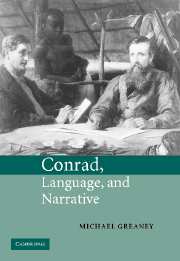Book contents
- Frontmatter
- Contents
- Acknowledgements
- Introduction
- PART I SPEECH COMMUNITIES
- PART II MARLOW
- PART III POLITICAL COMMUNITIES
- 7 Nostromo and anecdotal history
- 8 Linguistic dystopia: The Secret Agent
- 9 ‘Gossip, tales, suspicions’: language and paranoia in Under Western Eyes
- Conclusion
- Notes
- Bibliography
- Index
7 - Nostromo and anecdotal history
Published online by Cambridge University Press: 22 September 2009
- Frontmatter
- Contents
- Acknowledgements
- Introduction
- PART I SPEECH COMMUNITIES
- PART II MARLOW
- PART III POLITICAL COMMUNITIES
- 7 Nostromo and anecdotal history
- 8 Linguistic dystopia: The Secret Agent
- 9 ‘Gossip, tales, suspicions’: language and paranoia in Under Western Eyes
- Conclusion
- Notes
- Bibliography
- Index
Summary
‘Conrad must have asked himself again and again: Is this novel to be a spoken or a written narrative, a story or a history?’ These, according to Albert J. Guerard, are the disarmingly simple either/or questions that vexed Conrad as he worked on his most ambitious novel, Nostromo (1904). Not that you would have suspected any such authorial indecision from the novel's magisterial opening pages, where academic history appears to have displaced oral story as the model of Conrad's fictional narrative. The narrator who introduces us to the volatile Latin American republic of Costaguana is well-versed in the region's colonial and commercial history, knows all there is to know about its remarkable landscape and peculiar weather-systems, and doesn't need to borrow the eyes and ears of his characters to witness its tempestuous political affairs. Nor does he choose to draft in a specialist raconteur, a Marlow-figure, to bring those events to life as ‘spoken’ narrative. Folklore and popular legends of the region are occasionally sampled, but the narrator's interest in oral culture seems broadly ‘anthropological’ rather than structural, and the novel's marginal storytellers never seem likely to challenge his control of the novel's language.
Conrad's decision to pension off Marlow at this stage of his literary career doubtless has a great deal to do with his growing mastery of the language and fiction of his adopted homeland – with ‘Heart of Darkness’ and Lord Jim to his name, he no longer needed to shelter behind an ‘English’ alter ego.
- Type
- Chapter
- Information
- Conrad, Language, and Narrative , pp. 115 - 134Publisher: Cambridge University PressPrint publication year: 2001

